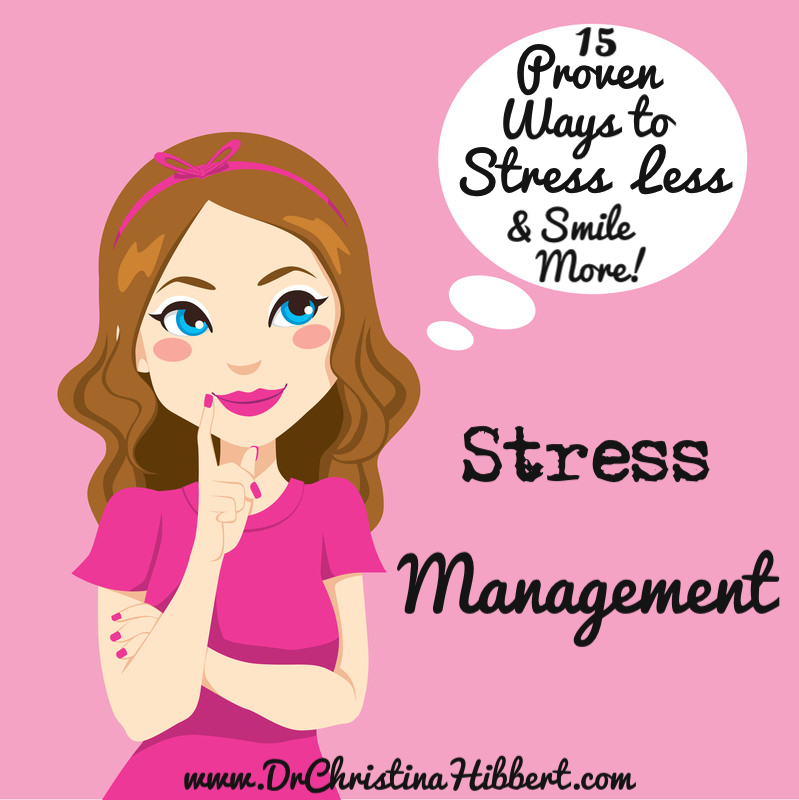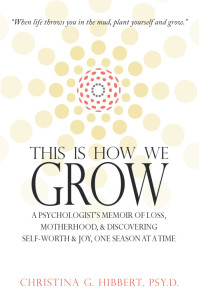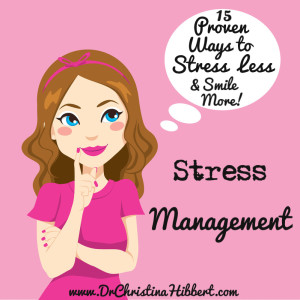
19 Aug Stress Management: 15 Proven Ways to Stress Less (& Smile More!)
Stress Management:
15 Proven Ways to Stress Less (& Smile More!)
I’m no stranger to stress. I’ve got a busy life, with six kids, after all!
At least, that’s what I tell myself: “I’m stressed because_____(it’s the end of the school year; it’s summer and all the kids are home; it’s back-to-school and I need to adjust; it’s the middle of the school year and the routine is insane!).” Or, “I’m just_____ (exhausted because the kids have been keeping me up late; emotional because of my hormones; worried about my kid’s or husband’s stresses; overwhelmed by tough clients and managing my private practice; stressed because I’m publishing my first book!).” Yes, I have plenty of good reasons to feel stressed.
But, about a month ago, my husband gave me a reality check in the midst of all my excuses. “Honey,” he said, “you’re always stressed.” I didn’t like it at first, but soon realized he was right! It was no longer just a stressful day or week; I had been continually stressed for months.
first, but soon realized he was right! It was no longer just a stressful day or week; I had been continually stressed for months.
Though my reasons may be valid, I had to remind myself, “I don’t believe in living a stressed-out life!” I don’t want my kids, husband, friends or family to remember me as a stress case! I don’t want to be frowning, complaining, and making life miserable all the time. And, I do not want to impair my health or well-being simply because I’m not taking care of myself by managing the stress in my life!
The Truth about Stress and Stress Management
I know the potential effects of stress: 1) on the body (aches, pains, sleeplessness, acne, poor eating habits, unhealthy weight gain/loss, back/neck problems, irritable bowel syndrome, headaches, increased risk for cancer, illness, heart problems, etc., etc.), and 2) on the mind (burnout, depression, anxiety, anger, irritability, and plenty of other mental and emotional disorders).
I know that short-term stress is bad enough, but, prolonged stress can do major damage. We’re not made to stay in that heightened state of alarm stress puts us in—in the fight-or-flight state where our body is bathing in the stress hormone, cortisol. And, I know that chronic stress can make existing mental and physical conditions worse and lead to poor habits and serious health issues.
I also know that the key to stress management is not to try to rid our lives of any and all stress. Though some stressors certainly can (and should) be removed, many of them (like kids!) cannot. Thus, the key to stress management is really this: We must learn to manage life stressors better.
15 Ways to Stress Less (& Smile More!)
The following are the methods I have used (and am currently using) to reduce stress in my life. They’re all techniques that have been proven to work, not only in the research, but by me too! (And, yes, I am smiling more as a result!)
1) Improve Quantity & Quality of Sleep. We live in a sleep-deprived world. But, when we’re tired, everything feels more stressful. Poor sleep is one of the biggest contributors to stress; it’s one of the biggest effects of stress too. Focus on getting to bed at a reasonable hour, sleeping the right amount (average 7-9 hours), and rising early. It’s one of the very best things you can do to lower stress. (For sleep help, check out: “Sleep Better, Cope Better”: 6 Insomnia Causes & Cures)
2) Exercise Regularly. Our bodies are made to move. When we fail to exercise, even moderately, we feel more tense, have more trouble sleeping, tend to gain more weight, and, overall, feel more stressed. There are countless benefits of exercise, and numerous activities that give us these benefits (walking, gardening, hiking, swimming–even sex!). Lowering stress just happens to be one of the best benefits of getting moving, so get out there! (Just getting started? Check out: Get Mentally & Physically FITT: How to Create an Exercise Program that Works!)
3) Practice Mindfulness/Breathing/Gratitude/Meditation/Prayer. Right up there with sleep and exercise, we need time to be still—to remind ourselves of the good that’s right in front of us, to remember that, in this moment, everything is okay. Our world is so fast-paced and noisy, it can be tough to see, hear, or feel our blessings, needs, and desires. Whether you practice meditation, take a walk and focus on nature, read sacred texts, or pray, each of these practices have been shown to reduce overall stress and help quiet your mind. I do a morning “hour of power,” which involves 30 minutes of exercise (including a gratitude prayer during my warm-up), followed by 30 minutes of meditation, scripture study, and prayer. When I get out of the habit of doing this, I immediately feel more tension and stress in my life. Try it. Or, try whatever will work for you. It’s an excellent way to start each day and prevent stress!
4) Gently Manage Stressful Thoughts. Once you’re still, you’ll start to hear all the thoughts that are wreaking havoc in your head. “Do this!” “Don’t do that!” “If you do this, they’re going to think that about you!” “You should really never do that!” It’s too much! And, these thoughts are more powerful than we realize. Listen for the thoughts that are causing trouble. Then, you can work to change some of your unwanted beliefs. (This will teach you how: Thought Management, Part 2: How to Change your Thinking (& Your Life!) Using a Thought Record.)
5) Work through Worries with The Worry Tree. Worry is just a way of staying stressed. Instead, take action, using my method, “The Worry Tree”! It’s the key to worry- (and stress-) free!
6) What Matters Most? Do that first. Do you know what matters most to you? Is it your children? Your partner? Your family? Your friends? Is it your work? Your hobbies? Your home? Take the time to list your top priorities. Then, do the most important things first. For instance, my top three are: 1) My relationship with God, 2) My relationship with my husband, and 3) My relationship with my kids. If these three things are lacking, I’ll always be stressed. Knowing what matters most helps you make sure you don’t miss it.
7) Evaluate and Adjust Expectations. “All frustration comes from expectations,” said Dr. John Lund. And, he is right. If you’re frustrated with life all the time, take a look at your expectations. My article, “Frustration & Expectations: How to Lower Expectations and Obliterate Frustrations” can help you out.
8) Play. Most adults fail miserably at this one, yet play reseracher Stuart Brown has said, “The opposite of play is not work. The opposite of play is depression.” We need play–time without purpose, time when we forget our stresses or how we’re perceived, time we want to last. What lights you up? What makes you feel young and engaged with life? Is it throwing a ball around, watching the cloud shapes with your kids, jumping on a trampoline? It is water-skiing, golfing, or going out with friends? Make time to play. It’s more important than you realize.
9) Relax. This is different than sleep or play. Relaxation is doing something that calms you, or doing nothing at all. I love to lay in a hammock and read or just watch the sunset. I also love a good power nap, hot bath, or massage. What relaxes you? Make a little bit of time for relaxation each and every day.
10) Boost Energy Naturally. A huge source of stress for most of us is lack of energy to do what we need to do. But, did you know that stimulants, like caffeine, can actually make stress and anxiety worse? If you find yourself stressed, ditch the “fake” energy, and shoot for the real deal through better sleep, nutrition, exercise, and meditation. It might be hard to do at first, but it’s one of the healthiest habits you can develop to beat stress.
11) Cut your “to-do’s” and Reduce Mental Clutter. Keeping a “to-do” list can cut the mental clutter. But, I learned a trick that has helped me tremendously. Make your “to-do” list. Then, prioritize items—A for “must do today” items, B for “should do today” items, and C for “it would be nice to do today” items. Then, cut the C’s. And, the B’s. After all, if it doesn’t need to be done today, it’s probably not that important.
12) Write about your Day. Get into the habit of writing in a journal or notebook at the end of each day. And, while you’re at it, focus on the good stuff (see these ideas for Practicing Gratitude). Research shows writing is a great tool for reducing stress, since getting things on paper helps it get out of your head, and helps you work through issues that might otherwise feel bigger than they really are. And, writing down three (or more) things you’re grateful for each night is a key to flourishing!
13) Slow Down and Practice Patience. We’re often in such a hurry, we stress ourselves out. If we’d just slow down, let ourselves breathe, and focus on one thing at a time, our bodies and mind would slow down too. I have to actively remind myself that it’s okay to work on one thing at a time, to take as long as I need, to stop wishing everything would hurry up! I can read as I wait for my appointment; I can play with my kids instead of wishing they’d let me work. It’s so worth it to slow down, and let things be.
14) Reevaluate Often. The most important key to stress management is to reevaluate often. Life changes. And so do we. What matters most at one phase of life might not matter so much in a few months or weeks, or even days. Check in with yourself and ask, “How is my stress level?” If it’s feeling healthy and manageable, you’re probably in a good groove. If it’s climbing again, it’s time to reevaluate, then, go back to some of the suggestions above, and get to work.
15) Practice smiling. The tools above can definitely help you cut the stress, which can help you feel happier, making you want to smile more. However, you can also practice smiling–on purpose. Research shows that when we put on a smile, our mood will often follow suit, reducing feelings of stress. So, the next time stress comes after you, pick one of these stress management tools, take a deep breath, and smile away! (It’s so much better than frowning, anyway!)☺
You may manage your subscription options from your profile.
Be sure to check out my bestselling, award-winning memoir, This is How We Grow!
Available now at Amazon or Barnes & Noble!
NEW! My latest book, “Who Am I Without You,” is available now at
Target, Amazon, Barnes & Noble, New Harbinger, or your local bookseller!
What’s stressing you out? What helps you stress less and smile more? Share your thoughts with us, below!
Let’s Connect!
SUBSCRIBE, above, “Like” me on Facebook Dr. Christina Hibbert; This Is How We Grow, & follow me on Twitter,Pinterest, & Instagram!
Related Posts:
Personal Growth & Self-Actualization
40 Physical & Mental Health Benefits of Exercise
Achieving Balance: Why You’ve Got it Wrong, & How to Get it Right
5 Steps to a Clutter-Free Mind (& Life!)
The 3 Layers of Self-Care: Build a Healthier, Happier YOU!
The Key to Worry Free: The Worry Tree!
Thought Management, Part 1: The Relationship Between Thoughts, Feelings, the Body, & Behavior
Daily Mindfulness: 4 Ways to Put More Being into what you’re Doing
Holiday Stress: Relationship Survival Guide!
Parenting Skills: 4 Ways We Learn to Parent, & The Good News about our Parenting Potential!
Parenting Success: It’s More about the Parent than the Child
Women’s Mental Health: 5 Facts Everyone Should Know
16 Things I’d Like My Postpartum Self to Know, 16 Years & 6 Kids Later
Stress Resources:
National Institute of Mental Health: Fact Sheet on Stress
Web MD: The Effects of Stress on Your Body
American Psychological Association: How Stress Affects Your Health






Stress management has become the need of the hour as it has become common for stress to creep into our daily lives. Often people ignore stress considering it as a part of life not realizing the fact that it slowly engulfs our life and invites more physiological and psychological problems.
I couldn’t agree more.
Reducing stress in your everyday life is vital for maintaining your overall health. That is why i think the most effective and rewarding techniques in managing your stress is meditation. This encourages you to relax your mind and examine your inner self with a sense of honesty and compassion. Anyway, nice post on this site! NiagaraFallsHypnosisCenter.com
I agree, Cassandra. Meditation is excellent! 🙂